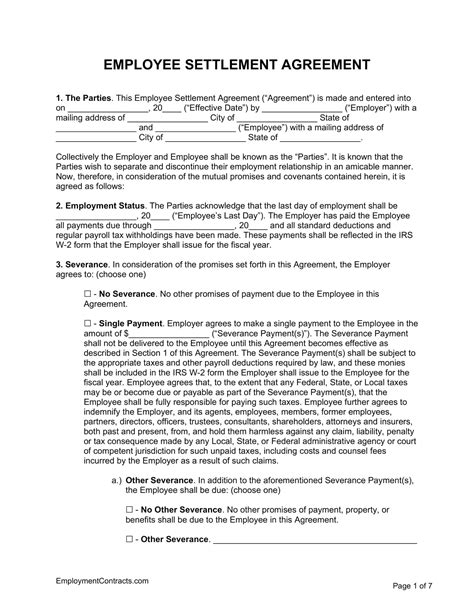Severance Agreement: Know Your Rights (Under 40)
Navigating a job loss is never easy, but understanding your rights when presented with a severance agreement is crucial, especially for younger professionals under 40. While severance isn't legally mandated in most cases (exceptions exist for specific circumstances and locations), a well-negotiated severance package can provide financial security and peace of mind during a career transition. This guide breaks down key aspects of severance agreements and empowers you to make informed decisions.
What is a Severance Agreement?
A severance agreement is a legally binding contract between an employer and an employee outlining the terms of their separation. It typically includes details about severance pay, benefits continuation (health insurance, for example), non-compete clauses, and confidentiality agreements. Understanding the implications of each clause is vital before signing.
Why is it Important to Understand My Rights?
Signing a severance agreement without careful review can inadvertently waive important legal rights. You might unknowingly forfeit the ability to pursue claims for wrongful termination, discrimination, or unpaid wages. This is particularly critical for younger professionals who may have fewer financial resources to weather a prolonged legal battle.
What are Common Clauses in a Severance Agreement?
Several standard clauses appear in most severance agreements. Knowing what they mean will help you negotiate effectively.
Severance Pay:
This outlines the amount and payment schedule of your severance. It's usually calculated based on your salary and tenure. Don't hesitate to negotiate for a more favorable payout.
Benefits Continuation:
This clause dictates how long your health insurance and other benefits will continue after your employment ends. Negotiate for extended coverage, especially if you're between jobs.
Non-Compete Clause:
This restricts your ability to work for a competitor or start a competing business for a specified period and geographic area. Carefully consider the limitations and ensure they are reasonable. A poorly drafted non-compete could severely impact your future career prospects.
Confidentiality Clause:
This prohibits you from disclosing confidential information about your former employer. This is often standard practice but should be reviewed to ensure it's not overly restrictive.
Release of Claims:
This is a crucial clause. By signing, you typically waive your right to sue your former employer for various reasons, including wrongful termination. Understand the full implications before agreeing.
What Should I Do Before Signing?
1. Review Carefully: Don't rush the process. Take your time to thoroughly read the entire agreement.
2. Seek Legal Advice: Consulting an employment lawyer is strongly recommended. They can help you understand the complexities of the agreement and advise on your negotiating power.
3. Negotiate: Don't be afraid to negotiate. You may be able to secure better terms regarding severance pay, benefits continuation, or the non-compete clause.
4. Ask Questions: If anything is unclear, don't hesitate to ask questions. Your employer should be willing to clarify any ambiguities.
Negotiating Your Severance Package
Negotiating a severance package can significantly impact your financial stability. Prepare by gathering relevant information: your employment history, performance reviews, and any evidence of wrongful termination or discrimination (if applicable). Your lawyer can guide you in presenting your case effectively.
What if I Feel Pressured to Sign?
If you feel pressured to sign without adequate time for review or legal counsel, resist. You have the right to request an extension to consult with a lawyer. Signing under duress can invalidate the agreement.
Common Mistakes to Avoid
- Signing without reading: This is the biggest mistake. Always read the entire agreement carefully.
- Ignoring legal advice: Consulting with an employment lawyer is highly recommended.
- Underestimating your negotiating power: You may have more leverage than you think.
- Rushing the process: Take your time to make an informed decision.
Conclusion
Navigating a severance agreement, especially as a younger professional under 40, requires careful consideration and a proactive approach. By understanding your rights and seeking professional legal advice, you can protect your interests and secure a fair and favorable severance package. Remember, preparation and informed decision-making are key to a smoother transition during this challenging time.

